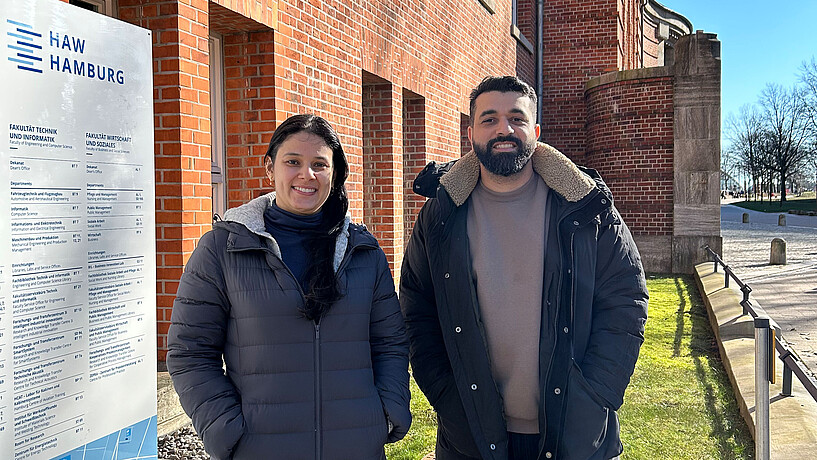HAW HAMBURG: Hi Mila and Daniel, it’s great to have you here! Would you like to tell us a bit about yourselves?
Mila: Hi, my name is Mila Rocha. I'm from Brazil, specifically from the state of Rio de Janeiro. I have a degree in physics. During my PHD and my Postdoc, My research focus has been on applying a physic-based technique to study target gases of environmental interest and I work on developing sensors for detecting greenhouse gases in agricultural settings.
Daniel: I am Daniel Santos, and I am also from Brazil, from the same city as Mila. I have a bachelor’s degree in physics and a master’s in natural sciences. Mila and I worked together in Brazil before coming to Germany as part of the same research program (DAAD). I started my PhD in natural sciences in 2022, focusing on improving sensor technology for detecting greenhouse gases and multiple gas detection by photoacoustic spectroscopy.
HAW HAMBURG: Could you tell us a bit more about your research project? What’s the focus of your work?
Mila: Our focus is on developing sensors for detecting greenhouse gases, especially nitrous oxide. Even though there’s less of it in the atmosphere than CO₂, it’s almost 300 times more potent in terms of global warming. Since agriculture is a major source of nitrous oxide emissions, we’re looking for better ways to measure and monitor it.
HAW HAMBURG: That sounds like an exciting approach. What are the biggest challenges in making these sensors usable in real-world conditions?
Daniel: And the key challenge is cost. In Brazil, we used very precise laser-based sensors, but they cost over €15,000 each — not exactly practical for widespread and industrial use.
Mila: Here in Hamburg, we’re working on an LED-based alternative that could cost less than €1,000. If we can maintain accuracy at a fraction of the cost, this could be a game-changer.
Right now, we’re still perfecting the sensors, but soon we’ll start comparing our results with agricultural data from Brazil.
HAW HAMBURG: So, what brought you to Hamburg?
Mila: Our project is part of a research exchange program between Brazilian and German universities, funded by the DAAD and CAPES. The idea is to bring together expertise from both sides. We’re here in Hamburg now, but German researchers have also traveled to Brazil as part of the program.
Daniel: And that’s important! Brazil has a strong scientific community and valuable expertise, especially when it comes to tropical agriculture. By working together, both countries benefit — Germany can learn more about agricultural practices and environmental challenges in tropical regions, while we gain new perspectives and access to different technologies and research infrastructures. It’s a real exchange of knowledge and experience.
HAW HAMBURG: What was your first big impression — or maybe even a little culture shock?
Daniel: The cold! Seriously, in our hometown, it’s always around 30°C. We arrived in October and had to go straight into winter mode. At first, even 10°C felt freezing, but now it’s not so bad. But below zero? Still a struggle!
Mila: I thought the cultural differences would be harder to adjust to, but I was pleasantly surprised. People in our research group have been very welcoming, and living in a student accommodation helped a lot — we met people from all over the world right away.

